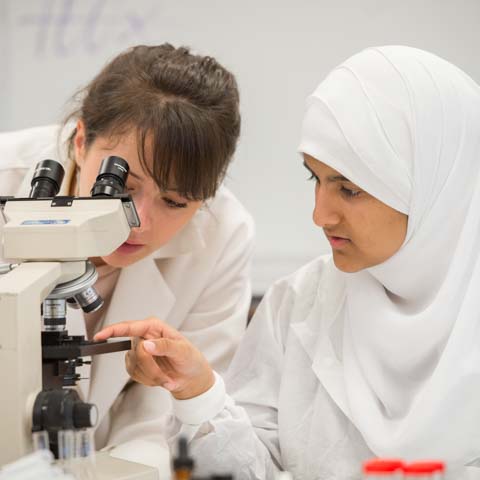Adolescent Biology M.S.T.

Please Note: Admissions to the following program are currently on hold for the 2024-2025 application cycle. Program faculty are in the process of redesigning this program and we will update this site to indicate future admission cycles.
To nurture middle school and high school students’ knowledge and appreciation of the life sciences, a teacher needs more than a foundation in biology.
This program develops teacher candidates’ knowledge and understanding of adolescent learning and development, educational theory, and best practices in science education.
Admissions Information
Application Deadlines
- Fall: June 30
- Spring: November 15
- Summer (both sessions): April 15
Browse the Admissions section for more about the application and financial aid processes.
General Teacher Education Program Admissions Requirements
- 3.0 GPA
- Online application
- Official transcript(s)
- Resume or Curriculum Vitae (C.V.)
- Personal statement
- Two letters of recommendation
Adolescence Biology applicants can choose among three programs:
-
This path prepares graduates to be classroom biology teachers for grades 7-12. There is also an option to add an extension for grades 5-6.
Admissions Prerequisites
Applicants must have 30 college credits in biology courses such as Anatomy/Physiology, Behavior, Cell Biology, Biological Diversity, Ecology, Evolution, Genetics, Growth, Human Biology, and Microbiology.
Program Curriculum
All descriptions for program courses are available in the GSE Bulletin.
-
This path prepares graduates to be classroom biology teachers for students with disabilities.
Admissions Prerequisites
Applicants must complete or have completed 18 credits or more in a biology major or concentration including coursework in these areas: anatomy and physiology, ecology, evolution, genetics, cell biology, microbiology, behavior, diversity, growth and human biology.
Program Curriculum
Browse course schedules and descriptions and review a list of courses.
-
This path prepares graduates to be classroom Biology teachers and special education teachers with an extension in Biology.
Admissions Prerequisites
Applicants must have an earned degree in biology (or a related field, for example, biological sciences), with a minimum of 30 credits in biology coursework. This content must include study in the following areas: anatomy, physiology, ecology, behavior, evolution, genetics, cell biology, microbiology, diversity, growth and human biology.
Program Curriculum
Browse course schedules and descriptions and review a list of courses.
Fieldwork Requirements
In the fall and spring semesters of the first year, students are in classrooms for three full days per week: observation for three weeks, then student teaching, in the same classroom, for ten weeks.
In the fall and spring semesters of the second year, students are in classrooms for five full days per week: observation for two weeks, then student teaching, in the same classroom, for twelve weeks.
Certification Information
The program leads to a Master of Science in Teaching degree and initial New York State certification.
Teacher candidates who meet all program requirements, complete the course of study, and meet established field experience competencies are eligible for Fordham University’s endorsement for New York state initial certification in their program area.
Pass rates for Fordham’s initial teacher education graduates on the NYSTCE Teacher exams have been over 95% each year.
Programs are open to all who qualify; however, only U.S. citizens or international students who possess a U.S. Green Card or H1-B visa may be recommended for New York State teacher certification.
Adolescence Biology Contacts
113 West 60th Street
Suite 1108
New York, NY 10023
212-636-6400
Fax: 212-636-7106
[email protected]
or